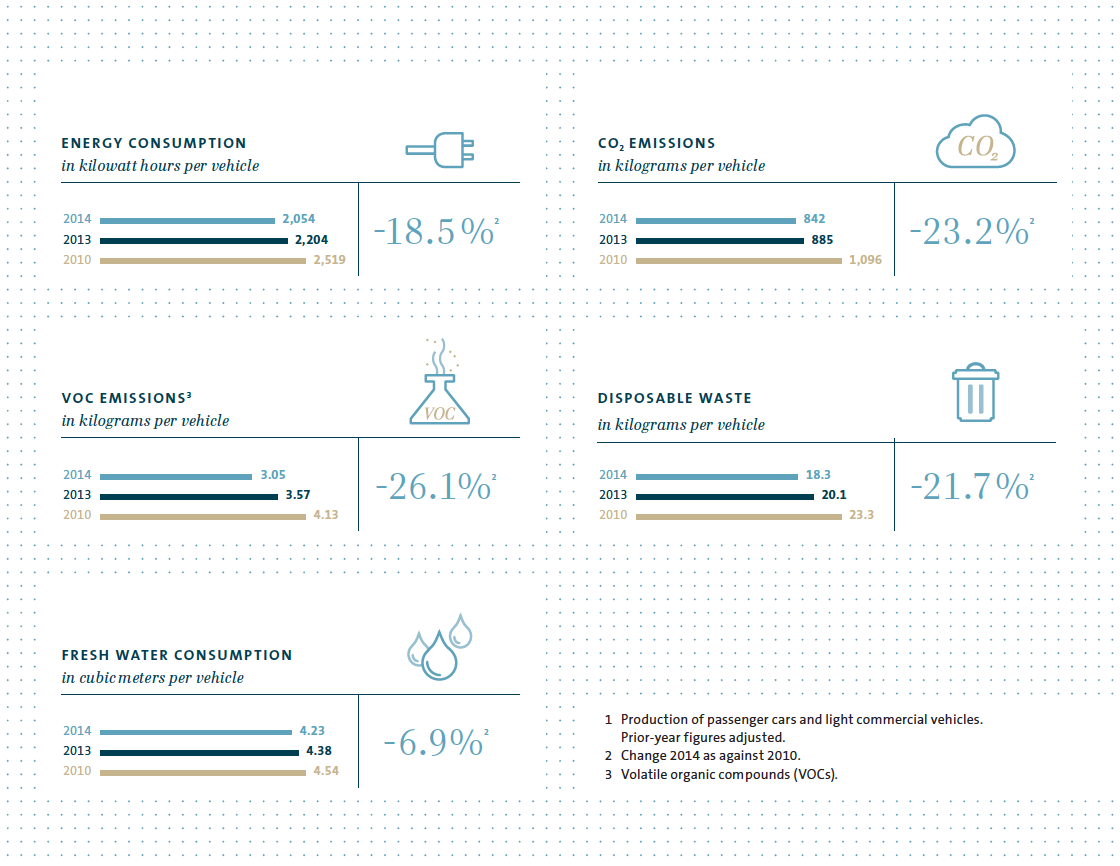Environmental management in the Group
We aim to be the leading automotive company in ecological terms as well by 2018. To help us achieve this goal, we agreed our Group environmental strategy encompassing all of our environmental protection activities at the end of 2013.
The modular structure of this Group environmental strategy focuses on our value chain and involves all business areas. We have established ambitious, measurable targets in these areas and are pursuing them systematically. This includes reducing CO2 emissions from our European new car fleet to 95 g CO2/km by 2020 as well as designing each new model generation to be 10 to 15% more efficient than its aiming to place us at the forefront of creating environmentally friendly products.
Another target area in our environmental strategy specifies that we are further extending our efforts to conserve resources across the entire lifecycle of our products. We plan to reduce CO2 emissions, energy consumption, water consumption, waste for disposal and organic solvents in the production process. By 2018, we aim to have reduced these five key environmental indicators for every vehicle produced throughout all of the Group’s locations by 25% when compared with 2010. The charts at the end of this page show clearly that we have already made considerable progress towards reducing all five of these key indicators, which are measured in accordance with the internal VW standard 98.000 in force across the whole Group.
We have also established environmental targets for the logistics, sales and marketing areas. Beginning in the reporting period, Volkswagen has been a member of the Clean Shipping Network, an association of marine cargo owners, and is represented on its management board. We will use the Clean Shipping Index in future as an assessment tool to analyze and reduce the environmental impact of marine shipments. We are also successively involving our dealerships in reducing emissions. For example, in 2014 Porsche launched a sustainability initiative to support its dealerships, with a view to improving energy efficiency in existing Porsche centers and designing new centers to be as efficient as possible.
The concept of “intelligent mobility” in the environmental strategy addresses future mobility solutions. This is where our drive to reduce inefficiencies, satisfy our customers’ mobility and comfort requirements and promote environmental protection all comes together. The concept is based on the efficient interplay of people, infrastructure, technologies and means of transport.
In light of the global trend towards urbanization, for example, vehicle noise reduction is also increasingly becoming a priority. We are not only developing ever quieter vehicles; we are also committed to reducing overall traffic noise. We therefore developed a noise level tool in collaboration with the prominent firm of Lärmkontor GmbH, Hamburg. The tool measures noise pollution in particular and illustrates how much noise is “perceived” by how many of the city’s inhabitants – depending on the noise reduction measures selected.
Anchoring environmental aspects firmly within our organizational and decision-making processes is essential to achieving our ambitious targets. The Group’s environmental management system has been in place for many years and provides the basis for ensuring that these aspects are taken into account. The Group’s environmental policy is a key component of this. It is based on the Group’s environmental principles that are in force worldwide. The environmental targets for technical development are also firmly anchored in the environmental management system. We make sure that these processes are regularly confirmed by submitting them to certification procedures and external audits, including in the current reporting year. An energy management system that was introduced successively into all locations from 2010 has been awarded ISO 50001 certification since 2012. In addition, Volkswagen’s German locations have voluntarily participated in the European Union’s Eco-Management and Audit Scheme (EMAS) since 1995. We have taken part in a growing number of environmental certification schemes since then, with the result that our locations worldwide as well as technical development have received certification under international standard ISO 14001, and additionally under ISO/TR 14062 since 2009.
The fact that environmental issues are firmly anchored within the Group is also reflected in the way that ecological aspects feature in all our employees’ thinking and actions – another target field in our environmental strategy. We pool and make use of all our employees’ skills and expertise in the area of environmental protection across brands and regions. Making sure that employees are well informed and attain qualifications is an important condition. For this reason, we employ environmental and energy management officers around the world, who help to build a broad basis for environmental protection within the Group.
